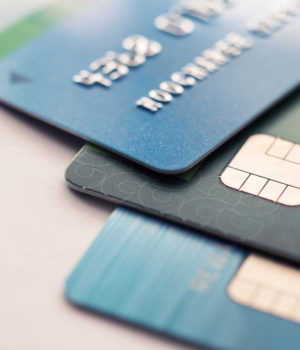It’s hard to imagine that something as ubiquitous as a credit card can be a difference-maker for your small business.
But while many business owners may have a business credit card, not all of them use theirs to their maximum potential—so they don’t see the kind of growth that is possible from utilizing one effectively.
Getting a business credit card when you first start your venture helps separate your business and personal finances, which makes good financial sense. That, however, is just the beginning of how a business credit card can help you succeed.
Let’s review some obvious, and not-so-obvious, ways that a business credit card can take your business to new heights.
Use it as a source of low-cost financing
When most people think of credit cards, they think of the scary-high interest rates and APRs associated with carrying a balance. And it’s true: If you don’t pay off your purchases quickly, you can end up adding thousands of extra dollars to your expenses over time.
But almost every financing option for new businesses—loans, lines of credit, etc.—will have high interest rates. Credit cards give you the possibility of financing a purchase without paying any interest, even for a short time. That wiggle room lets you use your available cash in more creative ways, funding more growth—a tactic e-commerce startup Boxed reportedly used to great effect.
For example, some elite business credit cards come with a 0% introductory APR, which sometimes last for up to 15 months. That’s essentially a no-interest loan (assuming you make your minimum payments) over the life of that offer.
Even if you don’t get a card with a 0% APR to start, there are benefits to using a credit card to finance purchases. Even the grace period before your payment is due—typically a few extra weeks, but sometimes as much as 60 days—can be a helpful source of financing.
Organize and improve your cash flow
One of the biggest hurdles to business success is uneven—and thus difficult to manage—cash flow. Credit cards give you a means to streamline your expenses, putting everything on one end-of-the-month bill, rather than scattering all of your costs across the calendar, and making it less likely that you’ll overspend.
On top of that, some cards even give you a bonus if you pay off your amount owed within 10 days of your statement closing date. That means you can save money by paying your bills quickly, and put those savings towards other needed investments.
Rack up rewards and benefits
One of the perks of using a credit card, whether business or personal, is that many come with rewards and benefits. The more you spend on them, the more you can end up saving.
Of course, this doesn’t mean you should buy things to get the subsequent rewards points—that’s how you end up going into credit card debt. But the amount of spending that’s required for your business on a monthly basis should be enough to give you rewards that you can use in a number of ways.
Different cards reward their users differently, and your business’s needs may dictate what card is best for you. If you travel often for work, a card that allows you to earn airline miles and other travel perks is a must. Buy a lot of office supplies? Some cards give you extra points or cash back when you purchase those.
Business credit cards also come with benefits such as extra insurance and purchase protection, so you won’t have to fear broken or faulty equipment, or a stolen device, throwing a wrench in your carefully laid budget plans.
Monitor your team’s spending
As mentioned above, cash flow issues can sink a business. According to CB Insights’ research, running out of money is—not surprisingly—one of the top reasons why small businesses fail.
If you pay for many of your expenses in cash, or use various payment methods that differ from bill to bill or invoice to invoice, your spending will be difficult to track. By using a business credit card, you’ll have more transparency into your spending and can identify inefficiencies and areas where you overspend.
Additionally, if you have a team that you allow to make purchases and pay for expenses on behalf of the company, you can give them credit cards with limits on how they can use them and how much they can spend. You can also set up alerts and reports so no fraud or other mismanagement takes place.
Build your business credit and access affordable financing
One of the least understood financial benchmarks in the world of small business is the business credit score. Business credit is different from personal credit—it’s represented by a different number, with different factors that dictate whether you’re deemed creditworthy.
Business credit is one of the most important factors that lenders, such as banks, use to determine whether to extend your financing, and at what rate. If you have a poor business credit score, you may only qualify for a loan with a high interest rate and short repayment terms. Better scores help you access elite financing options like SBA loans.
New businesses will have low business credit scores because they have a limited credit history. Start creating that history by using a business credit card and using it responsibly. Good business credit card habits will help elevate your score over time, giving you better loan options (if you need them) going forward.
A business credit card is an exceptional financial tool for nearly any business owner. While it isn’t a replacement for a stellar business plan, or a compelling marketing campaign, it’s a vital part of your arsenal in your quest for sustainable and responsible growth. You’ll need a business credit card when you start your venture to separate your finances—so why not take advantage of the situation, and use your card to put your business in the best position to succeed?
Eric Goldschein is the partnerships editor at Fundera, a marketplace for small business financial solutions. Eric has nearly a decade of experience in digital media and writes extensively on finance, marketing, entrepreneurship, and small business trends.







![Networking is for suckers… master Inbound Marketing [FREE REPORT]](https://anthillonline.com/wp-content/uploads/2015/03/inboundreloaded-253x194.png)
![Four principles to creating dedicated customers…or zombie loyalists with Peter Shankman [Free report]](https://anthillonline.com/wp-content/uploads/2015/11/Screen-Shot-2015-11-26-at-11.16.26-100x75.png)
![Ever considered crowdfunding? [FREE REPORT]](https://anthillonline.com/wp-content/uploads/2017/03/liz-wald-100x75.png)
![Five essential things to get right if you want to raise capital, with Bryan Vadas [FREE CHEAT SHEET]](https://anthillonline.com/wp-content/uploads/2015/08/vadas-3d-cover-01--100x75.png)

![How to secure lucrative sponsorships in five steps [CHEAT SHEET]](https://anthillonline.com/wp-content/uploads/2016/02/jackie-fast-meme-04-100x75.jpg)
![Know your niche! It’s working for the reinvented TigerAir [VIDEO]](https://anthillonline.com/wp-content/uploads/2014/04/InfrequentFlyers-300x338.jpg)

![Are you having a productive day? No? Then this video will show where you’re going wrong [VIDEO]](https://anthillonline.com/wp-content/uploads/2014/02/Go-300x350.jpg)
![Why introverts rule the world; we just don’t plan on shouting about our victory [VIDEO]](https://anthillonline.com/wp-content/uploads/2014/08/introvert-300x350.jpg)

![How To Grow Your Business and Profits with Jason Cunningham [CHEAT SHEET]](https://anthillonline.com/wp-content/uploads/2015/07/Cunningham-300x194.png)
![Need more leads? Here are five strategies [FREE DOWNLOAD]](https://anthillonline.com/wp-content/uploads/2016/04/james-FIVE-SIMPLE-STRATEGIES-TO-GET-MORE-LEADS-01-06.pdf-Box-2016-05-13-15-49-32-100x75.png)
![Strategic Alliances with Simone Novello [FREE INFOGRAPHIC]](https://anthillonline.com/wp-content/uploads/2015/08/Capture6-100x75.jpg)
![How did Sean Clark build a $300 million turnover company from a $500 AdWords investment? [CHEAT SHEET]](https://anthillonline.com/wp-content/uploads/2016/03/SEAN-CLARK-cheatsheet-NSFU-02.pdf-Box-2016-03-16-14-43-21-100x75.png)
![How to give good headlines, and create emails that get opened [CHEAT SHEET]](https://anthillonline.com/wp-content/uploads/2013/11/7-steps-cheatsheet-3d-cover-nuova--100x75.png)
![New Zealand’s Xero eyes US IPO, further disruption as subscribers increase [INFOGRAPHIC]](https://anthillonline.com/wp-content/uploads/2014/07/sruuuuujana-212x194.png)
![Ever wonder if your ‘content marketing’ is really just crap? You gotta see this! [INFOGRAPHIC]](https://anthillonline.com/wp-content/uploads/2014/08/content-100x75.jpg)
![7 Business Lessons From Game of Thrones [INFOGRAPHIC]](https://anthillonline.com/wp-content/uploads/2014/10/infographic-games-of-thrones-041-100x75.jpg)
![How to build your own Media Empire… In seven steps with Nathan Chan [INFOGRAPHIC]](https://anthillonline.com/wp-content/uploads/2014/10/Nathan-Chan-Infographic-e1413419529176-100x75.jpg)
![5 Business Lessons From Tinder [INFOGRAPHIC]](https://anthillonline.com/wp-content/uploads/2014/10/Tinder-Elegant-Infographic-100x75.jpg)



